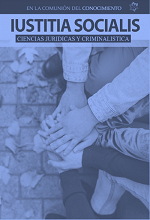Ilicit evidence and exclusion in the trial of public action offences
DOI:
https://doi.org/10.35381/racji.v5i3.1133Keywords:
Right to justice, criminal law, legal status.Abstract
In the Ecuadorian criminal procedure, illicit evidence constitutes one of the most debated problems; the determination of the illegality, its causes and effects, are often resolved by the courts in an unsatisfactory, and even contradictory manner; problems that are exacerbated when the processes fail to comply with constitutional and legal mandates in obtaining them. The general objective of the present work is to base theoretical assumptions on the illicit evidence and its elimination for the classification of crimes of public action. The research from the quantitative paradigm, we worked with a documentary descriptive methodology with a bibliographic design, allowing to investigate bibliographic and legal sources, articulating a theoretical reflexive body. A questionnaire was developed. It is concluded that the exclusion of the evidence declared illegal not only covers the evidence obtained directly in violation of a fundamental right, but also the subsequent evidence whose obtaining derives from the initial.
Downloads
References
Asamblea Nacional Constituyente de la República del Ecuador, (2008). Constitución de la República del Ecuador. Montecristi. Registro Oficial 449 de 20-oct-2008. Recuperado de https://n9.cl/sia
Asamblea Nacional de la República del Ecuador. (2014). Código Orgánico Integral Penal [Comprehensive Organic Criminal Code]. Recuperado de https://n9.cl/g6sc
Centeno-Maldonado, P., Navarro-Cejas, M., & Ochoa-Díaz, C. (2020). Responsabilidad probatoria en el proceso disciplinario ecuatoriano: postulados impuestos por normas infra legales. [Evidentiary responsibility in Ecuador's disciplinary process: postulates imposed by below-legal rules]. Revista Universidad y Sociedad, 12(5), 124-128. Recuperado de: https://n9.cl/cjb42
Cevallos-Sánchez, G., & Litardo-Salazar, F. (2018). Análisis de los principios constitucionales que regulan el nuevo Sistema Procesal Civil Ecuatoriano. [Analysis of the constitutional principles governing Ecuador's new Civil Procedural System] Revista Universidad y Sociedad, 10(5), 248-254. Recuperado de: https://n9.cl/091h
Código Orgánico General de Procesos (2015) [General Organic Code of Processes]. Registro Oficial Nº 506, viernes 22 de mayo de 2015. Recuperado de https://n9.cl/z8haz
Corte Interamericana de Derechos Humanos (2004). Caso Herrera Ulloa Vs. Costa Rica. [Herrera Ulloa Vs. Costa Rica case]. Sentencia (de 2 de julio de 2004). Recuperado de: https://n9.cl/zpt49
Figueroa, D. (2011). Veintiuna Tesis sobre el Legado Jurídico de la Revolución Francesa en Latinoamérica. [Twenty-one Thesis on the Legal Legacy of the French Revolution in Latin America]. ARS BONI ET AEQUI, 7(2),43-110. Recuperado de https://n9.cl/fai93
Gutiérrez-Campoverde, H., Cantos-Ludeña, R., & Durán-Ocampo, A. (2019). Vulneración del debido proceso en el procedimiento penal abreviado. [Violation of due process in abbreviated criminal proceedings] Revista Universidad y Sociedad, 11(4),414-423.Recuperado de: https://n9.cl/y9qjg
Hernández, R., Fernández, C., Baptista, P. (2014). Metodología de la Investigación. [Research Methodology]. México: Editorial Mc – Graw – Hill Interamericana.
Mercado-Maldonado, A., & Benavente-Chorres, H. (2010). El Estado en la gestión del conflicto: la reforma del proceso penal en Latinoamérica. [The State in Conflict Management: Reform of criminal proceedings in Latin America]. Opinión Jurídica, 9(17), 57-70. Retrieved January 22, 2021, from https://n9.cl/lnxj2
Zabaleta-Ortega, Y. (2017). La contradicción en materia probatoria, en el marco del proceso penal colombiano. [The contradiction in evidentiary matters, in the context of the Colombian criminal proceedings]. Rev. CES Derecho., 8(1), 172-190. Recuperado de: https://n9.cl/8cnn
Published
How to Cite
Issue
Section
License
CC BY-NC-SA : Esta licencia permite a los reutilizadores distribuir, remezclar, adaptar y construir sobre el material en cualquier medio o formato solo con fines no comerciales, y solo siempre y cuando se dé la atribución al creador. Si remezcla, adapta o construye sobre el material, debe licenciar el material modificado bajo términos idénticos.
OAI-PMH URL: https://fundacionkoinonia.com.ve/ojs/index.php/Iustitia_Socialis/oai










